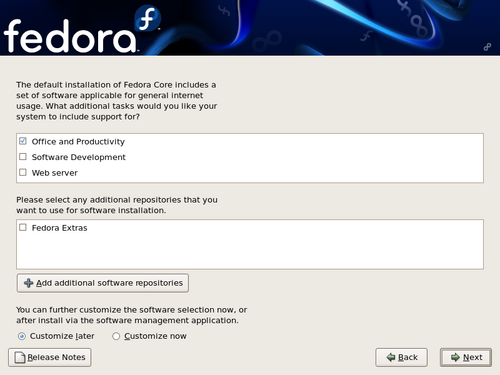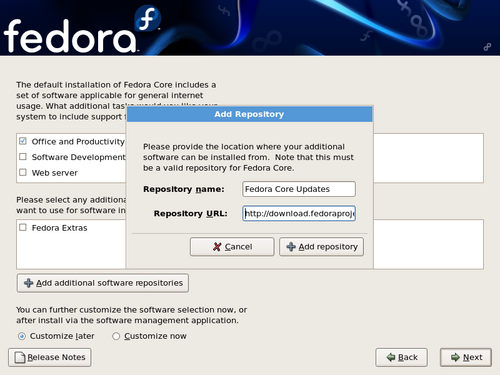By default, the Fedora installation process loads a selection of software that is suitable for a desktop system.
To include or remove software for common tasks, select the relevant items from the list:
- Office and Productivity
This option provides the OpenOffice.org productivity suite, the Planner project management application, graphical tools such as the GIMP, and multimedia applications.
- Software Development
This option provides the necessary tools to compile software on your Fedora system.
- Web server
This option provides the Apache Web server.
You can define additional repositories to increase the software available to your system during installation. A repository is a network location that stores software packages along with metadata that describes them. Many of the software packages used in Fedora require other software to be installed. The installer uses the metadata to ensure that these requirements are met for every piece of software you select for installation.
The Fedora Extras software repository contains thousands of additional packages you can add at installation time if desired. To add the Fedora Extras software repository to the installation program, select Fedora Extras from the repository listing. Fedora Extras is already defined in the installation program and requires no further input. For more information about Fedora Extras, refer to the Release Notes or http://fedoraproject.org/wiki/Extras.
![[Note]](./stylesheet-images/note.png) | Fedora Extras and Network Connectivity |
|---|---|
The Fedora Extras repository selection is available if your computer has a connection to the internet. |
To include software from repositories other than Fedora and Fedora Extras, select Add additional software repositories. The following list includes examples of ways you can use this option.
Get the Latest Fedora Software. If you provide the location of a repository of updates for Fedora Core, your system will have the most recent versions of Core software. You will not need to peform a system update immediately after installation to get these updates. This usage is ideal if you are installing over the Internet or any network where bandwidth is a concern.
![[Caution]](./stylesheet-images/caution.png)
Upgrading and Updates Package updates during the release cycle of a single verison of Fedora are intended to upgrade only that version. If you are upgrading a previous version of Fedora, you may encounter problems if you include an update repository during this step. Problems are less likely when performing a fresh installation.
Install Third-party Software. You may provide the location of a repository of third-party software. Depending on the configuration of that repository, you may be able to select non-Fedora software during installation.
If you select Add additional software repositories, the following dialog appears:
Provide a name for the repository and the URL for its location. Here are some URLs for listings of specific Fedora software repository mirrors.
Fedora Core Updates - http://fedora.redhat.com/download/mirrors/updates-released-fc6
Fedora Extras - http://fedora.redhat.com/download/mirrors/fedora-extras-6
The URLs above provide a list of actual mirrors. You cannot use
them verbatim in the Add repository dialog.
Visit the URL for a list of actual repository locations. If you
see the text $ARCH in the URL, substitute your
system's architecture. See Chapter 2, Understanding i386 and Other Computer Architectures for more information on
architectures.
Once you provide information for an additional repository, the installer reads the package metadata over the network. Software that is specially marked is then included in the package group selection system. See Section 15.2, “Customizing the Software Selection” for more information on selecting packages.
![[Note]](./stylesheet-images/note.png) | Backtracking Erases Added Repository Data |
|---|---|
If you choose Back from the package selection screen, any extra repository data you may have entered is lost. This allows you to effectively cancel extra repositories. Currently there is no way to cancel only a single repository once entered. |

